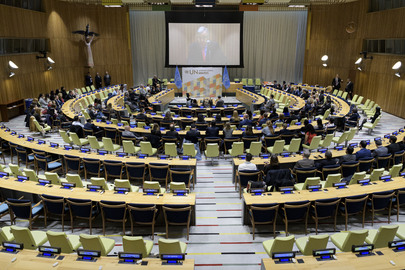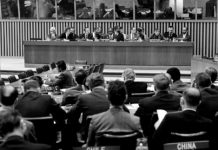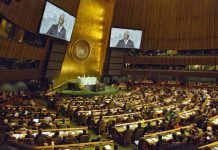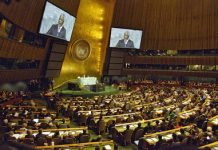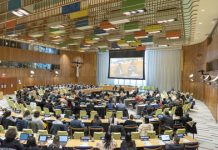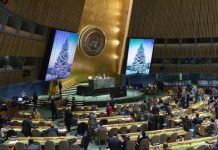Gaza briefing to the Security Council
The UN Special Coordinator for the Middle East, Ramiz Alakbarov, has highlighted the importance of building upon the current ceasefire to prevent continuing violence and insecurity.
He told the Security Council on Thursday that the UN is working to implement its 60-day response plan to expand access routes and secure critical aid for those in need.
Mr. Alakbarov said there was a 46 per cent increase in aid entering the Gaza Strip during the first week of the ceasefire, as tracked by the UN.
But more crossings and safe passages for aid workers and civilians are required to ensure an effective response.
“While the ceasefire is in effect, the ongoing violence in Gaza – continued but sporadic attacks and strikes by IDF and Palestinian armed groups as well as apparent killings of Palestinians by Hamas and other armed actors – also undermines humanitarian efforts and threatens stability in the Strip. Restoring order will be a critical step in facilitating relief efforts and supporting Gaza’s recovery.”
Mr. Alakbarov also brought attention to the situation in the occupied West Bank, saying that tens of thousands of Palestinians are still displaced from their homes and must be allowed to return.
The Palestinian economy and Palestinian Authority’s fiscal situation also face challenges as Israel continues to withhold some $3 billion of Palestinian tax revenues.
Mr. Alakbarov said the UN will continue to support all efforts to end the occupation and resolve the conflict in line with international law and UN resolutions, realising a two-State solution so that the two parties can live side-by-side in peace and security.
Sudan: UN agencies urge immediate action to address escalating crisis
Four United Nations agencies called on Thursday for the international community to do more to end the war in Sudan, and address the immense civilian suffering there.
The country is facing one of the world’s severest humanitarian emergencies, with more than 30 million people in need of assistance, including over 9.6 million internally displaced, and nearly 15 million children.
During recent visits to Sudan, senior leaders from the International Organization for Migration, the UN refugee agency, UNICEF and the World Food Programme witnessed the devastating impact of the crisis across the country.
Since the beginning of 2025, more than a million people have returned to Khartoum alone, both a sign of resilience and “a warning”, agencies say.
Now in its third year, the brutal conflict has destroyed essential services like healthcare and education. 14 out of 17 million school-aged children are out of school.
Also returning from a visit to the country, Ted Chaiban, UNICEF Deputy Executive Director, said that “entire communities are surviving in conditions that defy dignity. Children are malnourished, exposed to violence, and at risk of dying from preventable diseases.”
The four agencies are calling for an immediate cessation of hostilities and protection of civilians, unhindered humanitarian access, urgent and flexible funding, and support for those displaced.
Green light for Gang Suppression Force tells Haitians ‘they are not alone’
The people of Haiti have not given up and “their fortitude gives us hope,” the UN Special Representative to the country has told the Security Council, briefing for the first time as head of the UN office there, (BINUH).
Carlos Ruiz Massieu addressed the continuing gang violence and humanitarian crisis, the upcoming political transition set to take place next year and the bid to restore national security through the recently authorised Gang Suppression Force (GSF).
“There is no doubt that the circumstances are dire, but the Haitian people have not given up. Their fortitude certainly gives us hope. (…) The human rights situation also remains deeply concerning, with widespread abuses linked to gang attacks, violence involving self-defence groups, and even some security operations.”
He welcomed the pledge by Haitian authorities to consult with political representatives regarding national elections to avoid a political vacuum beyond February, noting that dialogue is crucial to secure the country’s future.
Ileana Exaras, UN News
Source of original article: United Nations (news.un.org). Photo credit: UN. The content of this article does not necessarily reflect the views or opinion of Global Diaspora News (www.globaldiasporanews.com).
To submit your press release: (https://www.globaldiasporanews.com/pr).
To advertise on Global Diaspora News: (www.globaldiasporanews.com/ads).
Sign up to Global Diaspora News newsletter (https://www.globaldiasporanews.com/newsletter/) to start receiving updates and opportunities directly in your email inbox for free.


